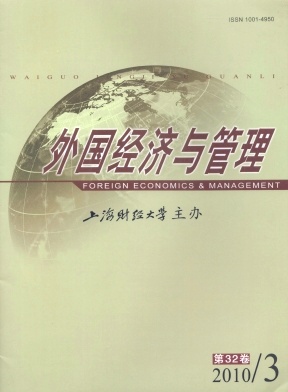交易操纵型盈余管理研究述评
外国经济与管理 2010 年 第 32 卷第 03 期, 页码:18 - 25
摘要
参考文献
摘要
由于会计准则的弹性空间日趋收紧,交易操纵型盈余管理逐渐引起主流学术界的重视。本文首先从交易操纵型盈余管理的性质、动机和手段三个方面来系统梳理相关研究,然后分析相关实证研究中的计量问题,并探讨交易操纵型盈余管理的经济后果及其约束机制,最后在梳理相关文献的基础上展望未来研究方向,以期推动交易操纵型盈余管理研究。
[1]Healy,P M,and Wahlen,J M.Areview of the earnings management literature and its i mplications for standard setting[J].Ac-counting Horizons,1999,13(4):365-383.
[2]Ewert,R,and Wagenhofer,A.Economic effects of tightening accounting standards to restrict earnings management[J].The Ac-counting Review,2005,80(4):1 101-1 124.
[3]Schipper,K.Commentary on earnings management[J].Accounting Horizons,1989,3(4):91-102.
[4]Graham,J R,Harvey,C R,and Rajgopal,S.The economic i mplications of corporate financial reporting[J].Journal of Accountingand Economics,2005,40(1-3):3-73.
[5]Roychowdhury,S.Earnings management through real activities manipulation[J].Journal of Accounting and Economics,2006,42(3):335-370.
[6]Cohen,D A,Dey,A,and Lys,TZ.Real and accrual-based earnings management inthe pre-and post-Sarbanes-Oxley period[J].TheAccounting Review,2008,83(3):757-787.
[7]Gunny,K.What are the consequences of real earnings management?[EB/OL].Available at SSRN:http://ssrn.com/abstract=816025,2005.
[8]Zang,A Y.Evidence on the tradeoff between real manipulation and accrual manipulation[EB/OL].Available at SSRN:http://ssrn.com/abstract=961293,2007.
[9]Xu,R Z,Taylor,G K,and Dugan,M T.Review of real earnings management literature[J].Journal of Accounting Literature,2007,26(2):195-228.
[10]Dechow,P M,and Sloan,R.G.Executiveincentives andthe horizon problem:An empirical investigation[J].Journal of Accountingand Economics,1991,14(1):51-89.
[11]Jackson,S B,and Wilcox,WE.Do managers grant sales price reductions to avoid losses and declines in earnings and sales?[J].Quarterly Journal of Business and Economics,2000,39(4):3-20.
[12]Bartov,E.The ti ming of asset sales and earnings manipulation[J].The Accounting Review,1993,68(4):840-855.
[13]Hermann,D,et al.The sale of assets to manage earnings in Japan[J].Journal of Accounting Research,2003,41(1):89-108.
[14]Black,E L,et al.Earning management using asset sales:Aninternational study of countries allowing noncurrent asset revaluation[J].Journal of Business Finance and Accounting,1998,25(9-10):1 287-1 317.
[15]Colvin,G,and Benner,K.GE under siege[EB/OL].Fortune Magazine,http://www.fortuneeducation.com/articles/2008/GE_Under_Siege.pdf,2008.
[16]Ayers,B C,et al.Do firms purchase the pooling method?[J].Reviewof Accounting Studies,2002,7(1):5-32.
[17]Comiskey,E,and Mulford,C W.Invest ment decisions and the equity accounting standards[J].The Accounting Review,1986,61(3):519-525.
[2]Ewert,R,and Wagenhofer,A.Economic effects of tightening accounting standards to restrict earnings management[J].The Ac-counting Review,2005,80(4):1 101-1 124.
[3]Schipper,K.Commentary on earnings management[J].Accounting Horizons,1989,3(4):91-102.
[4]Graham,J R,Harvey,C R,and Rajgopal,S.The economic i mplications of corporate financial reporting[J].Journal of Accountingand Economics,2005,40(1-3):3-73.
[5]Roychowdhury,S.Earnings management through real activities manipulation[J].Journal of Accounting and Economics,2006,42(3):335-370.
[6]Cohen,D A,Dey,A,and Lys,TZ.Real and accrual-based earnings management inthe pre-and post-Sarbanes-Oxley period[J].TheAccounting Review,2008,83(3):757-787.
[7]Gunny,K.What are the consequences of real earnings management?[EB/OL].Available at SSRN:http://ssrn.com/abstract=816025,2005.
[8]Zang,A Y.Evidence on the tradeoff between real manipulation and accrual manipulation[EB/OL].Available at SSRN:http://ssrn.com/abstract=961293,2007.
[9]Xu,R Z,Taylor,G K,and Dugan,M T.Review of real earnings management literature[J].Journal of Accounting Literature,2007,26(2):195-228.
[10]Dechow,P M,and Sloan,R.G.Executiveincentives andthe horizon problem:An empirical investigation[J].Journal of Accountingand Economics,1991,14(1):51-89.
[11]Jackson,S B,and Wilcox,WE.Do managers grant sales price reductions to avoid losses and declines in earnings and sales?[J].Quarterly Journal of Business and Economics,2000,39(4):3-20.
[12]Bartov,E.The ti ming of asset sales and earnings manipulation[J].The Accounting Review,1993,68(4):840-855.
[13]Hermann,D,et al.The sale of assets to manage earnings in Japan[J].Journal of Accounting Research,2003,41(1):89-108.
[14]Black,E L,et al.Earning management using asset sales:Aninternational study of countries allowing noncurrent asset revaluation[J].Journal of Business Finance and Accounting,1998,25(9-10):1 287-1 317.
[15]Colvin,G,and Benner,K.GE under siege[EB/OL].Fortune Magazine,http://www.fortuneeducation.com/articles/2008/GE_Under_Siege.pdf,2008.
[16]Ayers,B C,et al.Do firms purchase the pooling method?[J].Reviewof Accounting Studies,2002,7(1):5-32.
[17]Comiskey,E,and Mulford,C W.Invest ment decisions and the equity accounting standards[J].The Accounting Review,1986,61(3):519-525.
引用本文
陈波, 王翠婷. 交易操纵型盈余管理研究述评[J]. 外国经济与管理, 2010, 32(3): 18–25.
导出参考文献,格式为:
上一篇:战略共识理论研究述评
下一篇:企业政治关系研究前沿探析





 6866
6866  991
991

